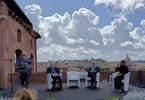During his farewell speech to the parliament Thursday evening,
Tanzanian President Jakaya Kikwete said his ten-years of leadership
has seen a smooth growth in tourism.
He said his outgoing government has been focusing on tourism through
marketing, promotion, and development and had achieved an annual growth by 7.1 percent as per last year’s figures.
The tourism sector has also recorded remarkable growth in the past 10 years, in which the sector grew by 7.1 percent and its contribution
to the country’s foreign exchange stands at 25 percent.
“My government has managed to raise the number of tourists visiting
our country, Tanzania, from 612,754 in 2005 to 1,140,156 in 2014,
while the number of beds increased from 15,828 to 21,929,” Mr. Kikwete
said.
Revenue from tourism grew from US$823.05 million in 2005 to US$2 billion in 2014, while employment from the sector increased from 32,673 to 686,130, he added.
“Tourism is now Tanzania’s leading foreign currency earning sector
and key economic sector,” he said.
He spelled out his government’s efforts carried out to protect African
elephants through an anti-poaching drive, while his outgoing government has dissolved the once poorly-managed Wildlife Division to create a powerful Tanzania Wildlife Authority (TAWA) effective this month.
During his ten-year term in office, Mr. Kikwete had campaigned and
championed Tanzania’s tourism development and participated in a
number of tourism discussions and conferences organized in Tanzania,
America, and several other parts of the world.
Other than tourism conferences and dialogues, Mr. Kikwete had invited
a number of tourist investments in hotels and lodges, and officiated
the opening up of new classic lodges in the Serengeti eco-system,
Arusha Municipality, and Bagamoyo on the Indian Ocean coast, among
other tourist facilities being managed by leading hotel chains.
With 45 million people, Tanzania is among the poorest nations in
Africa despite its rich resources made up of abundant wildlife for
tourism, vast land for agricultural development, and tourist
attractiveness in its scenery.
Mr. Kikwete has been on the forefront to visit all the key and famous
tourist attractive sites in Tanzania, including the world’s best-known
Serengeti National Park and Ngorongoro Conservation Area in northern
Tanzania.
He had as well, launched a campaign in major American cities during
his UN General Assembly meetings in New York. Television commercials
were aired on CNN, CNN Headline News, and CNN Airport, as well as
CNN.com, with the aim of persuading more American tourists to visit
this African country.
During a past tour to the US, Mr. Kikwete picked the famous American
businessman and photographer, Mr. Douglas Pitts, as Tanzania’s
Goodwill Tourism Ambassador to America.
Taking advantage of the eighth Sullivan Summit held in Tanzania’s
northern city of Arusha in 2008, Mr. Kikwete campaigned to woo
Americans of African origin, urging them to come to Africa to visit
their ancestral lands on the continent.
In his keynote address to over 4,000 delegates of the summit, he spoke
perfectly as a senior tourist campaigner for his country, telling the
African Diaspora in the United States to come back and visit their
lands of origin.
“Please come and visit Africa and invest in this vast, rich, and
tourist attractive continent. Tanzania assures you of a good return of
your capital and protection,” he told the delegates, most of them from
North America.
He said Africa needs foreign investments in tourism, and the African
Diaspora in the US were in the best position to take advantage of
their ancestral continent in order to invest.
Turning into an authoritative tourist campaigner, President Kikwete
said Africa has little shares in global tourist gains despite the
continent’s rich attractions made up of wildlife, attractive
geological features, and history.
Among key, global tourism events of which he participated and
addressed, included was the 33rd Africa Travel Association (ATA) Congress held at Tanzania’s northern tourist city of Arusha in May, 2008 and which Mr. Kikwete was the chief guest.
Speaking to some 300 ATA Congress delegates, Mr. Kikwete said Africa
was lagging behind in global tourism shares because of poor resources
shared among each country. He said Africa’s share in global tourist
business is small despite that the continent has been blessed with
abundant natural tourist attractions.
Africa expects to receive about 77 million tourists in 2020, but the
number is too small compared to its abundant and unbeatable
attractions, the president told the 33 ATA Congress delegates.
Comparatively, Africa lags behind compared to the global share of 1
billion and 1.6 billion tourists during the same period, he added.
Africa had as well remained behind in tourism development because of
poor resources and underdeveloped infrastructure, which for decades hampered traveling within and outside the continent.
He said Africa badly needed developed infrastructure and accessibility
to global travel markets, mostly the American and European market
outlets.
Air connection in Africa has been a permanent setback in tourism
development among the countries. “Traveling from one African nation to
another is difficult that one may have to go to Europe in order to get
air connection to another country located within the boundaries of the
continent,” Mr. Kikwete noted to the 33rd ATA Congress delegates.
The outgoing Tanzanian president as well opened and addressed
250-plus delegates of the 5th International African Diaspora Heritage
Trail Conference (ADHT) held in the Tanzanian capital city of Dar es
Salaam late in 2010.
Speaking to ADHT delegates, Mr. Kikwete encouraged Americans of
African origin to visit this continent to see the rich cultures Africa
has been endowed with, as well as its wildlife resources.
Other remarkable tourist functions which he had addressed and worked
out tourism development plans including conferences and field trips to
mark 50 years of the discovery of the skull of oldest man at Olduvai
Gorge in Ngorongoro, northern Tanzania, way back in 2009.
Mr. Kikwete participated at the global event which celebrated the 50
years of the milestone discovery of the skull of the oldest man in the
world that was made by Africa’s famous archaeologists, Dr. Louis
Leakey and his wife Mary, in the excavation area of Olduvai inside
Ngorongoro Conservation Area Authority (NCAA).
The president ordered authorities to construct an international-class
museum to preserve the oldest human footprints, plus exhibition rooms
for archaeological findings so as to attract more tourists to Tanzania and Africa.
Officiating the opening of the first edition of the Swahili International Tourism Expo (S!TE) late last year, Mr. Kikwete waived away the fear sweeping among foreign tourists over the spread of the Ebola pandemic in Africa, saying the continent was safe, while governments were fully united to fight the outbreak.
He decried over negative publicity of the African continent, saying
this continent is worth a visit.
Despite ups and downs in Tanzanian politics, Mr. Kikwete remains the
friendliest leader of Tanzania, and the man who has led 45 million
people without grudges or suppression to any person.
A section of residents in Tanzania’s capital of Dar es Salaam and who
monitored the outgoing President’s speech through local television
stations, told eTN that the outgoing head of state had led this African nation with a human face.
“He is more humanitarian than a politician. He never oppressed anyone,
even his political opponents. He treated his political foes equally to
others and loved even those who opposed his leadership straightly,” a
city resident told eTN.
Mr. Kikwete said he was happy to leave his top post and the people at
peace, and to also leave Tanzania as a united country, which is now heading to its general elections for a new president.
WHAT TO TAKE AWAY FROM THIS ARTICLE:
- elephants through an anti-poaching drive, while his outgoing government has dissolved the once poorly-managed Wildlife Division to create a powerful Tanzania Wildlife Authority (TAWA) effective this month.
- Diaspora in the US were in the best position to take advantage of.
- The tourism sector has also recorded remarkable growth in the past 10 years, in which the sector grew by 7.






















